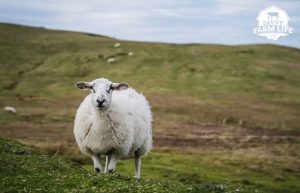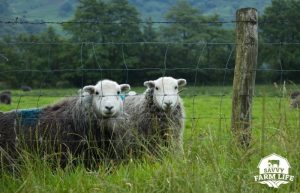
What You Need to Know About Sheep Straying From the Flock
If you have a sheep who tends to wander from the flock, you may be wondering why sheep do this and how you can prevent them from straying so that they remain safe from predators and other dangers. While the majority of sheep like to stay near their flock, you may occasionally come across a sheep that is more independent.
Why do sheep stray? Sheep may stray from the flock if they sense danger approaching. This can cause them to blindly run away to avoid what is frightening them. Sheep may also stray simply to satisfy their curiosity, or because they are not paying attention while grazing. Of course, a sheep will also wander from its grazing spot if the rest of the herd is also wandering so that they can stay together.
Sheep do not have many physical defenses to protect themselves from their natural predators. For this reason, they have a very strong flocking instinct – remaining with the flock, usually at all costs, is what ultimately protects the individual sheep. For this reason, it’s important to know why your sheep may be straying and what you can do to prevent it. Read on!
Why Do Sheep Stray From The Flock?
We know that the sheep’s strong flocking instinct is their greatest protection, and they know this too – a sheep feels safe within its flock, and will become stressed and agitated if separated. (To learn more about a sheep’s flocking instinct, visit my article How Do Sheep Protect Themselves? Essential Guide.) So why do sheep occasionally stray?
Sheep May Stray If Frightened
Sheep are prey animals, and as discussed earlier, do not have many physical defenses. Even though the sheep is not a particularly fast animal – running up to 20 miles per hour – running away is going to be its best chance at survival if confronted with danger. If a sheep believes it is in danger, it may panic and flee without thought – unfortunately he may just flee in the opposite direction of the flock, away from his best chance at safety.
Once the perceived threat to the sheep has subsided, he will realize that he has been separated from his flock. This will result in distress and agitation, and you or the flock will (hopefully) hear his calls for help.
What Frightens Sheep?
Because of their vulnerable nature, sheep are especially skittish prey animals and can get spooked quite easily. Sheep are gifted with an excellent sense of smell, hearing, and sight and are constantly on the lookout for danger. In fact, a sheep has such excellent peripheral vision that they can see behind them without even turning their heads. While they lower their heads to graze they often tilt their eyes upward so that they can always maintain a sense of what is around them. To learn more about sheep vision, visit my article What Sheep Can See: Color Spectrum, Range of Vision & More.
Because of these excellent senses, not much catches them by surprise and they may spook at the slightest hint of danger. The movement in the brush behind them may be as harmless as a rabbit or a falling branch, or it may be a coyote or a mountain lion. If a sheep detects a possibly dangerous situation, they may panic and run, even if that means they end up unintentionally wandering away from the rest of the flock.
The Sheep’s “Flight Zone”
The amount of personal space an individual sheep needs to feel safe and comfortable is called the sheep’s “flight zone”. If an animal or person that the sheep does not trust enters this flight zone, the sheep will flee to maintain its bubble of safety. If a sheep feels safe, her flight zone will be smaller. If she feels threatened, she will maintain a larger flight zone. While fleeing to maintain her space, she may inadvertently run away from the flock and become separated.
Sheep May Stray To Satisfy Curiosity
Most of us understand goats to be especially curious creatures, getting into all sorts of trouble to investigate anything that may strike their fancy. Though this tends to be true of the nature of goats, sheep are not immune to letting curiosity get the best of them either. A sheep that is safely tucked into the flock may see an interesting (and seemingly unthreatening) object and might wander away from the flock to investigate further. Distracted with its investigation, he may end up separating himself from the flock and wandering off. Eventually, he will discover his error and will become stressed, calling out to the flock until he finds his way back.
Sheep May Stray to Find Food
 While sheep may stray to satisfy their curiosity, they may also stray simply because they encounter some particularly tasty weeds or grass. Sheep spend most of their day with their noses to the ground, happily eating the day away. While they are usually aware of their surroundings and their proximity to their flock and home, they may also become distracted in their search for food and mistakenly wander off.
While sheep may stray to satisfy their curiosity, they may also stray simply because they encounter some particularly tasty weeds or grass. Sheep spend most of their day with their noses to the ground, happily eating the day away. While they are usually aware of their surroundings and their proximity to their flock and home, they may also become distracted in their search for food and mistakenly wander off.
This wandering will put the sheep in danger, as a lone sheep can look like easy pickings to a predator. For this reason, sheep are almost always raising their eyes to survey their surroundings while grazing and will usually notice they are wandering too far before putting themselves into a dangerous situation. The sheep that wanders away from its flock to eat is usually the exception to the rule.
Sheep May Stray By Following Other Sheep
Sheep are followers – and as discussed earlier, this is a positive trait for them and is their greatest defense against predators. There are usually leaders within each flock, and these are the ones that the rest will follow without question. Unfortunately for the followers, leaders sometimes get distracted too, and may wander or become spooked and run in the opposite direction of home.
When one sheep bolts, the rest may very well bolt with him, assuming (sometimes correctly, sometimes incorrectly) that danger is imminent and they must stick closely together to survive. This is the reason that an entire flock may wander from their home – because they are simply following the one who strayed so that they remain together. You have to admire their commitment to one another!
How To Prevent Your Sheep From Straying
Now that you know why your sheep may be straying, what can you do to prevent them wandering and keep them safe?
Fences for Wandering Sheep
If you want your sheep confined to your property, you really must have proper fencing. Fencing will not only keep your sheep from wandering, but will also protect them from predators. While sheep are relatively easy to keep confined with a reasonable livestock fence, you also need to take into account the types of predators that are in your area in order to determine the best fencing for your property.
What Type of Fencing?
There is no shortage of different types of fencing when it comes to livestock. You may choose to use woven wire fences, mesh fences, rail fences, electric fences, or a combination of these materials. Which material you use will depend on your property, your local predators, and your budget. Regardless of which fencing material you use, you can also use electric strands with your fencing to ensure that predators keep from trying to climb over or dig under the fence.
Dogs for Wandering Sheep
There is a good reason that dogs have been used to herd sheep for centuries – it is because it works! A good sheep dog will have the natural instinct to keep sheep together, and where they are supposed to be. Sheep do not like the herding dog getting close to them and the dog uses this to his advantage – running back and forth to force the sheep toward the direction he needs them to go. Herding dogs are highly intelligent because they are bred to work independently and think for themselves through tricky situations that may arise.
The Border Collie, which is known to be the most intelligent dog breed in the world, is a herding dog and is an excellent choice for a sheep farm. Other herding breeds include but are not limited to: Rough- and Smooth-Coated Collies (like Lassie!), Australian Shepherds, Bearded Collies, and even German Shepherds.
Get a Livestock Guardians for Your Sheep
One way you can provide your sheep with more security is by investing in a livestock guardian. There are numerous species of animals that make good livestock guardians, from dogs to donkeys and even llamas. Each one of these animals are known for their protective nature and the ability to defend their area. Livestock guardians will chase off predators and also provide a safe presence for your sheep.
To find which livestock guardian would work best for your flock, visit my article What Are the Best Livestock Guardian Animals?
Keeping Your Sheep Safe
Whatever the reason(s), if you keep a flock of sheep you will likely encounter straying. It is important to keep your sheep safe from predators, and from becoming lost, by taking preventative and protective measures such as fencing and/or livestock guardians.
Want to learn more about sheep behavior? Check out my article Why Sheep Bleat: Essential Behavior Guide.
